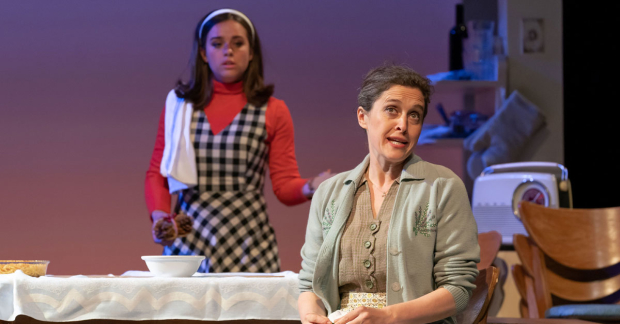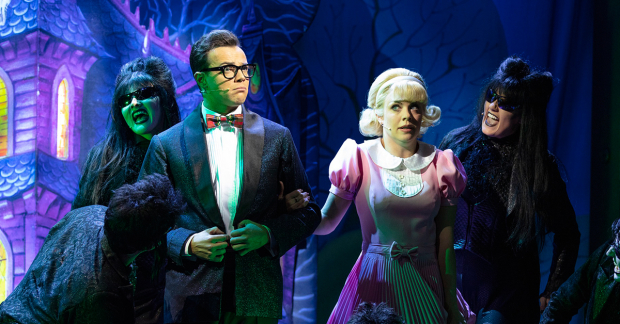Review: Napoli, Brooklyn (Park Theatre)

With women's voices being so thrillingly and essentially at the centre of popular culture at the moment, Meghan Kennedy's Napoli, Brooklyn looks, on paper at least, like a winner. Critically well received at its 2017 Off-Broadway premiere, it arrives in London with a female director, designer and lighting designer (Lisa Blair, Frankie Bradshaw and Johanna Town respectively) and a predominantly female cast.
The tale of an Italian immigrant family in 1960s Brooklyn with a trio of sisters and a feisty but conflicted Mama trying to break out of the tyrannical grip of a violent patriarch, it ought to be meaty and incendiary. Cliché piles upon cliché however – the culinary metaphors come thick and fast as the one area matriarch Luda is confident in is her cooking; she's Italian, and a mother, so…she cooks and she cares. But what gets served up here is an anaemic, undercooked mess.
This is particularly frustrating as the first half does a decent job of setting up the characters and their various issues. Luda has lost the ability to cry and might be about to embark on an illicit fling with the smitten Irish butcher, middle daughter Vita has been beaten up by Dad and incarcerated in a nunnery, youngest daughter Francesca is in love with the butcher's daughter and plans to escape abroad, while patriarch Nic is a proper bad'un (you can tell this because he glowers, bares his teeth like a madman and thumps the kitchen table when frustrated, which he seems to be for most of act one).
It's hardly Arthur Miller but it's certainly watchable, despite a succession of scenes that are so short that they suggest this was intended as a screenplay rather than for the stage, and certainly not one as exposing and scenically limited as the Park. It plays out like a schlocky, dated TV movie, right up to the moment where a major event disrupts everybody's lives. I won't spoil it for you except to say that if you have an onion allergy you might find it distressing. Blair's staging certainly doesn't stint on metaphor even as it struggles to embrace the fact that the audience is on three sides (cue lots of unconvincing swivelling in all directions while trying to deliver what should be precisely focused monologues).
The second act deals with the aftermath, and it's pretty excruciating. Nasty Nic has a poorly written about-face, thanks to the aforementioned event, before reverting to type (Robert Cavanah has a creditable stab at a role that defies logic) and there's a Christmas family feast which erupts into full-on conflict that is so badly directed that it's hard to work out who smacked whom. It might work better behind a proscenium arch but that's not where this production is playing.
There's much aimless shuffling on and off, ham-fisted period references plus a lack of real tension; this is a directorial/writing issue but it makes the cast look inadequate, and the accents – whether Italian or Brooklyn – are mostly terrible. Madeleine Worrall (Luda) is a fine actress but reads as too young and about as Italian as Cate Blanchett; she is ultimately defeated by a story arc that requires her to ricochet between allegiances and emotions that make almost no sense.
Hannah Bristow's stroppy, likeable Francesca is the most relatable of the daughters, and Stephen Hogan does some nice, sensitive work as the gentle butcher who loves her mum. It's hard though to see how women's voices are being honoured when the plot turns on the behaviour of a feckless (male) bully whose actions rent asunder the relationships of the central female protagonists.
The final image is Luda telling her daughter's lost love that "you are a woman, and you are free". It should be moving and cathartic, but it comes across as unconvincing and wearyingly clichéd. Emilia this ain't. It's an inept production of a mediocre play. The only things likely to provoke tears here are the onions…and possibly boredom.
















